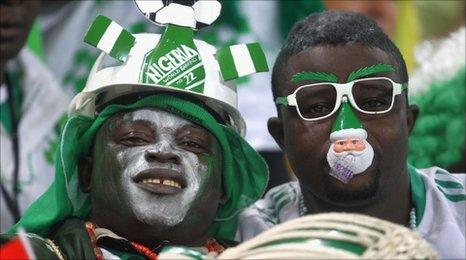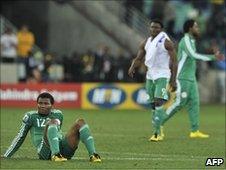Nigeria's strangled football industry
- Published

The fervour of the fans failed to save Nigeria's blushes on the pitch
Several teams have slumped out of this year's World Cup in humiliating fashion, but no nation has reacted to their team's failure as drastically as Nigeria.
The country's three top football officials have been sacked.
President Goodluck Jonathan tried to ban the team from competition - before backing down in the face of opposition by Fifa, the sport's governing body.
And a collective malaise seems to have spread through all levels of the game.
"The actual banning and un-banning of the team is irrelevant," says Churchill Olise, owner of elite football academy Ebede FC in Shagamu.
"What matters is that at last the powerful have realised the seriousness of our problem.
"Sport is the one area where we can compete internationally - and win. We simply cannot continue to waste our young talent."
In theory, an abundance of gifted young players ought to make Nigeria a global super-power in the game.
But insiders point to squandered talent, a national sport strangled by poor infrastructure, and football officials obsessed by gaining re-election for themselves. There is also evidence of corruption.
In many ways, the sport mirrors Nigeria itself.
Nigeria football 'is dead'
"The sackings just scratch the surface," says Wilson Ajua, a lawyer and owner of Rainbow FC in Lagos.
"The president should take it further. The structures must be cleaned out and rebuilt."

Nigeria's players were expected to do better in South Africa
He points to problems deeper than corruption.
"Many of these local clubs are like empty shells without good players," he says.
"I believe the state of football in Nigeria is dead. The clubs are run as political tools, not as businesses."
A series of miserable performances saw the Super Eagles fail to make it past the group stages in South Africa.
Shortly after their exit, Mr Jonathan announced the team's withdrawal from competition for two years "to enable the country to put its house in order".
The board of the Nigerian Football Federation was dissolved, the anti-fraud police were sent in, and a second probe began examining the NFF's books.
But the withdrawal from competition sparked an eyeball-to-eyeball confrontation with Fifa.
It threatened Nigeria with sanctions and even expulsion from international competition. That would have punished the country's youth teams as well as the Super Falcons, the women's team, due to play at the forthcoming women's World Cup later in the year.
'Bow down to Blatter'
Football officials desperately tried to appease the president, and the three top bosses at the NFF were sacked - President Sanni Lulu, Vice-President Amanze Uchegbulam and the Head of the Technical Committee, Taiwo Ogunjobi.
And the Nigerian football authorities were forced into a begging public apology.
The Fifa threats, and promises of a radical overhaul of the NFF, appear to have persuaded Mr Jonathan to reverse his decision.
"President Goodluck Jonathan hearkened to the passionate appeals of top officials… and well-meaning Nigerians," said an NFF statement.
He changed his mind "for the sake of millions of Nigerian youth involved in the game", the statement said.
But football managers, trainers and fans fear that the sackings and the president's reversal mean an end to the promised shake-up - and that the same old game will continue.
Nigeria's newspapers see it as a defeat in a battle of wills.
"Fifa stares down Nigeria," grimaces one headline. "Nigeria blinks," groans another.
Crueller still are the fans on the online forums.
"Fifa = the new colonial power!" writes one. "Shall we all bow down and lick Blatter's feet?"